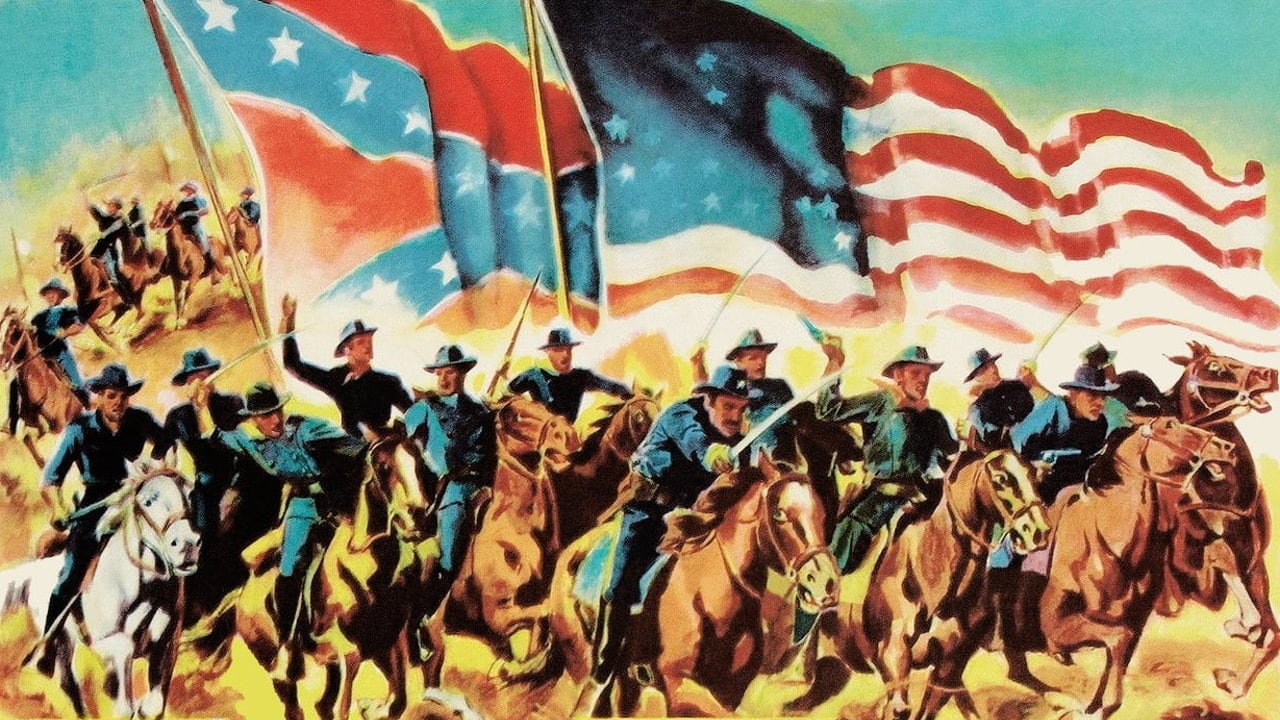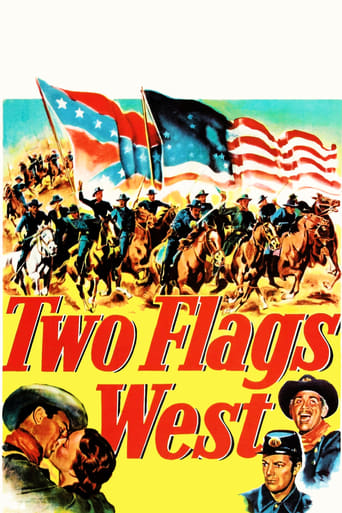

The second of only two westerns directed by the always interesting Robert Wise. As befits a reunion between two veterans of 'Citizen Kane' (Wise, who edited it, and star Joseph Cotton), 'Two Faces West' boasts pin-sharp black & white photography by Leon Shamroy and roofed sets, all well as impressive skyscapes shot in New Mexico.Backed by a vintage supporting cast, this is a relatively early example of the black & white postwar 'adult' western that occasionally brought gravitas to the genre during the fifties, with a plot that vaguely anticipates 'The Dirty Dozen', with a violent climax to match.
... View MoreA generally excellent and very unusual blend of leading characters for a Civil War western is combined with an unusual and tension-filled script, released by Fox and directed by Robert Wise: neither much known for their westerns. This B&W film was released shortly after Jeff Chandler costarred as Apache chief Cochise, in the well- regarded "Broken Arrow". Here, he plays the fort commander(Major Kenniston), in a region of troublesome 'Indians', evidently in SE New Mexico, not far from the Texas border. This is a risky place to have sent a contingent of dyed-in-the-wool ex-Confederate cavalry prisoners-of-war, who reluctantly agreed to serve as Union cavalry in the West, as opposed to continued rotting in a prisoner camp. The war clearly had entered its terminal phase, as Sherman was manhandling Georgia. Historically, a policy was initiated early in 1864, which allowed Confederate POWs to be repatriated if they would serve as Union soldiers: labelled as 'galvanized Yankees'. About 7000 POWs took advantage of this offer, mostly sent to areas far removed from the major battles of the time. This meant mostly to areas of the West which were undermanned, due to the exodus to the East, and where Native Americans(NA) were troublesome. However, unlike in the film, they were assigned as infantry, not as cavalry, and most were sent to outposts far from unconquered Confederate territory, thus further reducing the incentive to desert.Getting back to this film, in addition to Chandler, as Major Kenniston, we have frequent leading men Cornel Wilde and Joseph Cotten, who hardly are thought of as western or soldier actors,but add their charisma as Union and ex-Confederate officers, respectively. Cotten is OK in his pivotal role; but I would have preferred Randy Scott: clearly a true southerner by his speech. We are very lucky to have beautiful, forceful, Linda Darnell as the lead female(Elena), scripted as the widowed Latino wife of Chandler's brother , killed in battle in the East. She's decided to tag along with Chandler for a while, until joining a wagon train for her California home. The chief supporting actors include the always charismatic Arthur Hunnicutt, who provides an element of gritty authenticity to the ex-Confederates that Cotten(as Lt. Tucker) cannot, and Jay Flippen, as his Yankee counterpart, as sergeant.In Major Kenniston, I see strong parallels with Colonel Thursday, in the prior "Fort Apache". Both despise the regional unpredictable Native Americans. Both make a fatal mistake in insulting them, and in underestimating their ability to take revenge on him and his command., and both pay the ultimate price for their folly. Major Kenniston actually is looked upon as a hero in his demise, suffering a fate similar to that of Jose Mendoz, in "Seven Cities of Gold", and Sir Robert, in "Hudson's Bay", for example. Cotten(Tucker) takes on John Wayne's role in "Fort Apache", more or less, while Linda takes on Shirley Temple's role. Some other aspects of the screen play resemble Ford's recent "She Wore a Yellow Ribbon". In contrast to most Hollywood westerns of this era, even the NA chiefs appear to be real NAs. The main war chief is named Satank, who was a real Kiowa war chief during this era. However, SE NM is rather far west and south of the Kiowa's homeland, being Apache country. Also, most of the NA have Apache-styled headbands. Confusing! Although Hollywood liked to include the occasional NA attack on army forts, in fact, such were very rare on well built forts. They were typically too lethal for the NAs, who couldn't afford to lose many warriors in battle, with their decimated populations. The battle scenes, both outside and inside the fort are rather well staged. Included is an extended shot of a soldier with his shirt burning, after struck in the back with a flaming arrow. I hope he had some good fire-proof insulation under his shirt!We learn that Kenniston(Chandler) spent some time in the Richmond Libby POW facility, from which he escaped, probably as part of the historic mass escape somewhat dramatized in the 1940 Civil War western "Virginia City". We also learn that Kenniston's brother(Elena's husband) was killed in a charge lead by Tucker. Kenniston holds a personal grudge against Tucker for this, as well as a general hatred of all rebels, be they Confederate or NA.During the course of the film, it becomes clear that all 3 of the main officers(including Wilde as Bradford) , have hopes of snaring Elena. It also becomes clear that Kenniston's persistent refusal to give her permission to leave has less to do with the NA threat than his desire to keep her near. However, she's not interested in him as a suitor. She's more accommodating with Tucker and Bradford(who is killed), but it's clear they are secondary to her ambition to return to her California homeland.(Reportedly, privately , Linda much preferred the company of Chandler)Near the film ending, after the attacking NAs have left and we learn that Sherman has completed his subjugation of Georgia, we have an informal friendly competition between the Yanks and former Confederates in singing "The Battle Hymn of the Republic" vs. "Dixie". There was a similar scene in the subsequent Civil War western "Column South", which has several other commonalities with this film, including being scripted as taking place in New Mexico. However, that story takes place just prior to the opening shots of the war, rather than near it's terminus.Linda Darnell reportedly hated being cast as a cowgirl, because she suffered from dust and horse allergies.
... View MoreI first saw this movie when it came out and it has remained my favorite cavalry movie of all time. Yes, even more than the great ones John Ford produced, but not by much. In this story a detachment of cavalry is called upon to defend the plains and west from the Indians who have taken advantage of the Civil War to wreak havoc among the settlers, trappers, and gold seekers. This unit, however, has former prisoners from the CSA, who have been remanded from prison to serve in the west with the Yankee cavalry. If one knows anything about prison conditions in the north or south during the war, it is not difficult to see why many southern prisoners opted for service against the Indians. During World War II, the Germans got many Europeans and Russian prisoners to fight for them as the alternative in prison camps was tantamount to death. This story centers around a fort commanded by Jeff Chandler character, who tricks an Indian chief, killing, I believe his son or brother. The enraged chief attacks the fort with overwhelming force and only when Jeff Chandler goes out of the fort to trade his life for those left in the fort, does the attack stop with his sacrificial death. After a relief column arrives at the fort, do the survivors learn that the war is over and the south has lost. An interesting bit of history and true. Unfortunately there was another aspect to the Indian wars on the plains that has received short shrift, and that is the service rendered by the Ninth and Tenth Cavalry regiments: the Buffalo soldiers; the all-black army units who served faithfully and with honor for over twenty years, trying to subdue a people who wanted to live free for the benefit of a government that treated these soldiers as second class citizens. To my memory, only two films have been made about these Buffalo soldiers, and both 30 years apart. Yes, Two Flags West ably covers the part that southern prisoners played in the settling of the west, but it has taken too long to tell the story of the black soldiers who, often facing discrimination within the army itself, and trouble from white settlers, still carried out their duty. I hope that this fine film, Two Flags West, will come out in VHS soon.
... View MoreIn doing research I have a relative that did the same thing. Until I saw the movie I didn't understand how someone could switch sides during the civil. Is this movie based on a book? This is an over looked part of Civil War History. I would like to know if there are other movies about this part of history?
... View More